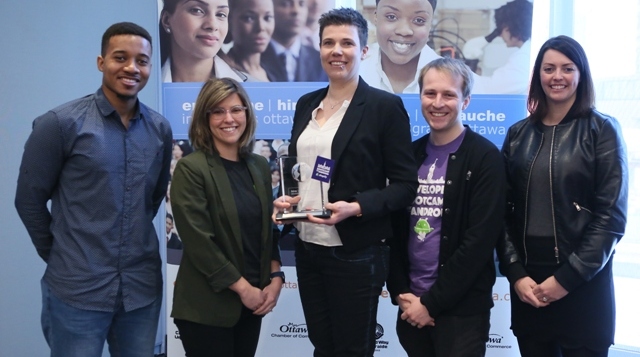A Creative Experiment to Access Immigrant Talent.
 Shopify is an international company with many hard to find and pressing talent needs.
Shopify is an international company with many hard to find and pressing talent needs.
Founded by immigrants, Shopify is intentional and creative in addressing talent challenges in order to lead in a more diverse and connected world.
From the start, Shopify has encouraged experimentation, risk-taking, and pushing the envelope. This has resulted in tremendous success and growth for the organization, from five employees working out of a coffee shop to a team of over 3,000 working in six offices across North America.
Shopify has used these same values of creativity, experimentation and risk-taking to develop an innovative approach to access untapped immigrant talent. Realizing that traditional recruitment methods were not resulting in a significant increase in diverse candidates, Shopify decided to come at the challenge from a different angle. The idea was to directly target newcomers to Canada and to offer a program where Shopify could help develop people’s skills and see them “in action.”
In 2017, the Android Bootcamp pilot experiment was launched and focused primarily on newcomers to Canada. The Bootcamp was aimed at providing an opportunity for immigrants to demonstrate applied knowledge, teamwork and problem-solving potential to Shopify, while gaining practical skills, learning about the organization and expanding their own network.
Shopify reached out to more than 150 software developers who are newcomers to Canada and invited them to apply to the two and a half day Android Bootcamp. Before applying, individuals were invited to an information session to better understand the initiative and ask any questions. From this, 14 applicants were screened into the Android Bootcamp and participated in the program.
 The Android Bootcamp allowed Shopify to see the applicant’s potential beyond a standard interview setting and to focus on competencies and acquired skills, rather than credentials and experience. This is particularly important for immigrants whose international education and experience is not always recognized in Canada. Additionally, some immigrants may not have experience with developing on Android, but had other technical skills that could be transferable and applicable with minimal training. In a traditional job application process, these individuals may be overlooked.
The Android Bootcamp allowed Shopify to see the applicant’s potential beyond a standard interview setting and to focus on competencies and acquired skills, rather than credentials and experience. This is particularly important for immigrants whose international education and experience is not always recognized in Canada. Additionally, some immigrants may not have experience with developing on Android, but had other technical skills that could be transferable and applicable with minimal training. In a traditional job application process, these individuals may be overlooked.
In initiating the Android Bootcamp, Shopify took time to ensure that all of those involved were trained in cross-cultural competence awareness. They also tested the Android Bootcamp curriculum on a group of culturally diverse Shopify developers who had no previous Android experience. This provided feedback on how to improve the content, style and pace of training.
Shopify accommodated the needs of the software developers attending the Android Bootcamp by offering evening and daytime attendance options; accommodating all dietary restrictions; having a prayer room available, and loaning laptops to Android Bootcamp participants.
Through the Android Bootcamp, Shopify learned that accessing untapped talent through minor adjustments to recruitment and education process is possible. Following the Android Bootcamp, 10 of the 14 participants were invited for interviews and two participants have been hired.
The Android Bootcamp focused directly on supporting newcomers to Canada, helping to bridge the gap with talent and provide education and resources. It is but one example of how innovation and experimentation is used at Shopify to ensure they attract top talent from all dimensions of diversity. It is also part of a larger strategy for Shopify, where they are actively working to create and sustain a diverse and inclusive workforce where everyone can contribute to their fullest. “Diversity and inclusion are integral tenants of Shopify’s culture,” said Meghan Herman, Head of Inclusion and Innovation
As a fast-growing organization, hiring talented newcomers will ensure that Shopify can meet the growing talent needs and make more informed decisions to support its more than 600,000 merchants in 175 countries around the world.
